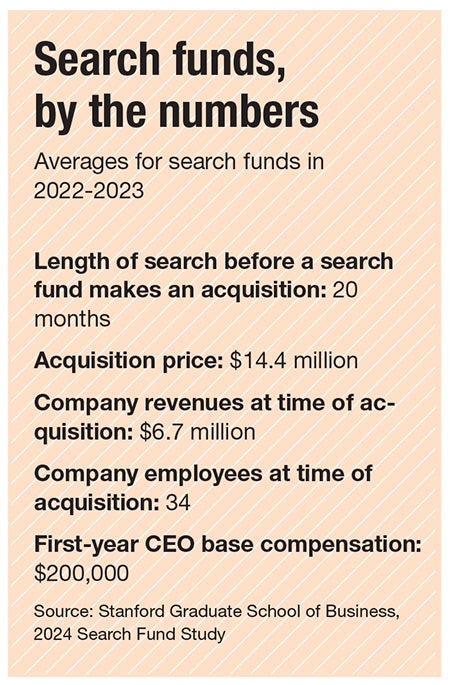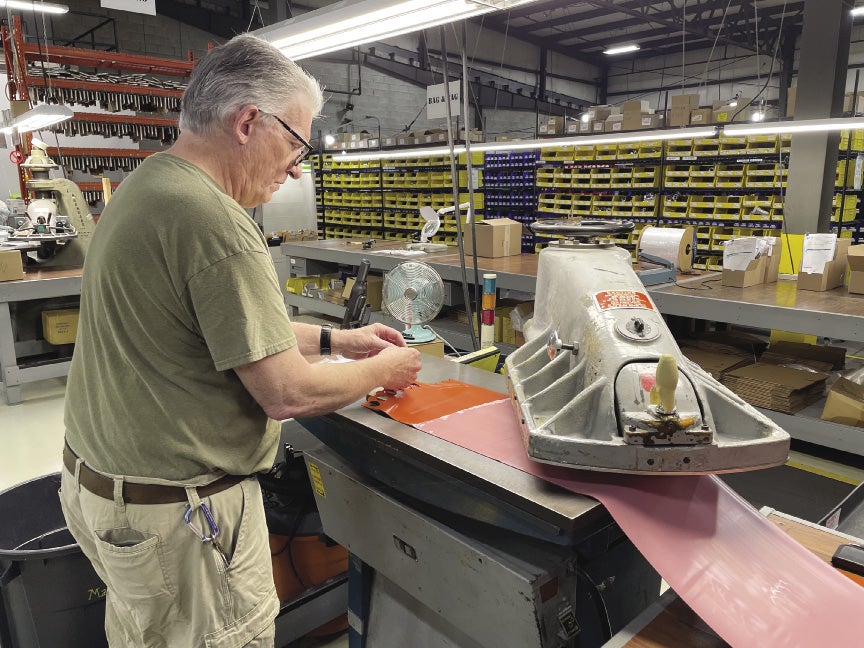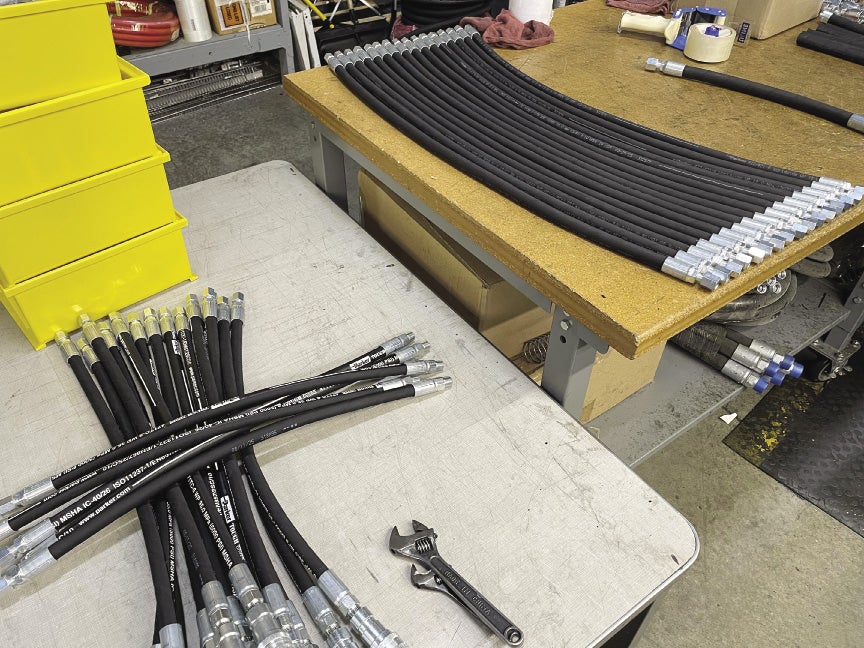Stimpson, who worked in Worcester for Morgan Stanley at 100 Front St. from 2008 to 2012, is now planning on expanding one of his businesses into Central Massachusetts.
Get Instant Access to This Article
Subscribe to Worcester Business Journal and get immediate access to all of our subscriber-only content and much more.
- Critical Central Massachusetts business news updated daily.
- Immediate access to all subscriber-only content on our website.
- Bi-weekly print or digital editions of our award-winning publication.
- Special bonus issues like the WBJ Book of Lists.
- Exclusive ticket prize draws for our in-person events.
Click here to purchase a paywall bypass link for this article.
Shaun Stimpson always envisioned owning a business.
So, he decided at 44 years old to leave his job in the finance industry and set out on a new career path: to find, acquire, and run a business through a search fund.
A search fund is when investors financially support often inexperienced entrepreneurs' efforts to locate, acquire, manage, and grow a privately-owned business, according to Stanford Graduate School of Business. Irv Grousbeck, who is former co-owner of the Boston Celtics and adjunct professor at Stanford, created the search fund in 1984.

The number of search funds remains relatively low, as Stanford identifies 681 formed in the U.S. and Canada since 1984, although the number appears to be climbing. A record number of 94 core search funds launched in 2023, and nine companies in Massachusetts have been acquired by search funds.
Stimpson had one investor who funded his 18-month search to find a business to acquire. When looking for a business, Stimpson focused nationally in the industrial distribution space, eventually buying Syracuse-based Mitten Fluidpower in 2022.
When looking for companies, Stimpson said he wanted a company already well established, so he could quickly learn the knowledge base and get up to speed on the products and pricing.
“The learning curve wasn't that steep, and it was mainly because I knew they were already running the day to day. They just lacked the kind of the strategy of how to grow,” Stimpson said.
He has worked to bring marketing strategies using social media and other avenues to culminate growth in the three businesses he now owns: Mitten, Frank Murken in Schenectady, New York, and FLN-MAR Rubber and Plastics in Holyoke.
Stimpson, who worked in Worcester for Morgan Stanley at 100 Front St. from 2008 to 2012, is now planning on expanding his businesses into Central Massachusetts. He has seen Greater Worcester go through a resurgence of growth, one of the reasons why he wants to put a satellite FLN-MAR location in Shrewsbury.
The FLN-MAR location in Shrewsbury will open this fall. He decided to expand into Central Massachusetts for the growth potential of the area and to provide better service to its existing customer base. Since FLN-MAR already has a base of customers in Central Massachusetts, the new local location will provide stronger resources to them.

The appeal of search funds
Search funds allow recent business graduates the opportunity to become a CEO right out of school.
As opposed to starting a business from scratch, a searcher can take over an already developed company, with the backing of investors to gain entrepreneurship experience.
However, the process of searching and acquiring a pre-established business requires many steps, said Jim DeLeo, co-chair of Canton-based CPA firm Gray, Gray and Gray’s transaction advisory services.

“We'll help them make sure that the value they think they're acquiring is actually the value that they're acquiring,” DeLeo said. “Then we'll also give them insight and guidance … as well as what it's going to look like after they acquire the business.”
DeLeo is seeing many post-graduates become searchers, due to growing search fund incubators at schools including Harvard University, Massachusetts Institute of Technology, Babson College, and Stanford University.
The 2024 Search Fund Study by Stanford said 48% of new searchers in 2023 reported enrollment in an entrepreneurship-through-acquisition class, up from 37% in 2022.
The chance to turbocharge their careers by starting as CEO at a young age is attractive for new business school graduates, said DeLeo.
Investors & search funds
Most searchers find an investor to fund their salary while they look for a business to acquire, and then look for investors who will fund their acquisition. Investors are often a safety net of professionals with experience who can provide coaching, which looks more appealing to businesses, said DeLeo.
This was the case for Stimpson who had one investor fund his search, and then went to look for additional investors when he was ready to buy Mitten. He put out a message on LinkedIn, and people stepped up and wanted to invest.
“Raising the money was actually the easiest part,” Stimpson said. “If you find the right company and structure the transaction the right way, like me, that could be the easiest part of the process.”
DeLeo has worked with both types of searchers, those with and without investors, and his CPA firm’s primary role is to be the eyes and ears from a financial perspective on those deals.

Ross Porter and his partner Alex de Pfyffer had a different approach. Porter and Pfyffer saved up the money and searched for a business without an investor once they graduated Harvard Business School in 2015.
Porter and de Pfyffer bought their first company in 2016, and over the last 10 years, have acquired around 40 businesses across 10 different industries through their Boston-based small business investment firm Heritage Holding.
Porter said he and de Pfyffer have since set up a small fund to become investors for searchers and going back to Harvard to talk to business students.
The growing popularity
After minimal growth in 2021 and 2022, the number of new search funds significantly increased in 2023, according to the Stanford Business School 2024 Study. No single factor drove this, but increased education about the model and growing amounts of investor capital may have attracted more entrepreneurs to search, the study said.
Porter said search funds can be a lucrative career: It gives flexibility in one’s life, and if successful, financially provides more money than a career in a big corporate setting or a consulting path would.
“The more people that succeed in this, the more potential searchers go out and learn that this path might not be as risky as it seems,” Porter said.
Searchers are looking for a good business to jump in and run, which is the biggest difference between a searcher and a private equity firm, DeLeo said. The ideal situation for a searcher is to find a business that someone has been running their whole life and can provide institutional knowledge about the industry before the searcher takes over.
“Growing a business is a fascinating journey, and it provides a lot of opportunity and challenges,” DeLeo said. “That's what excites a lot of these searches, which is the opportunity not just to acquire the business and monitor its success, but to actually be an integral part of day-to-day management.”

Not just college graduates
The median age of a typical searcher was 31 in 2022 and 2023, according to the Search Fund Study by Stanford. While more universities are growing search fund incubators, older people like Stimpson go into search too.
Stimpson went into searching while having a family and a mortgage, which he said was a big leap for him. Instead of creating a business from scratch, he chose to go down the search path due to financial need to support his family.
“I needed to make sure that I had all my ducks in a row,” Stimpson said. “This was my chance to take the training wheels off and see if I can do this on my own.”
Stimpson had many people who supported and helped him throughout his journey, like DeLeo and Porter, and now he is trying to give back to others who are starting their search.
“I am always trying to pay it forward and help other people that are in the same boat,” Stimpson said.
